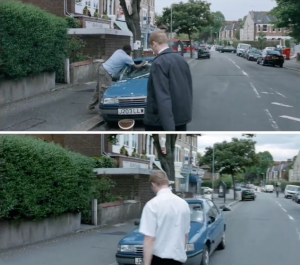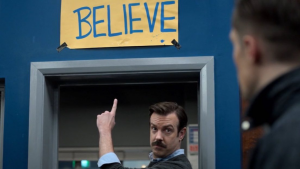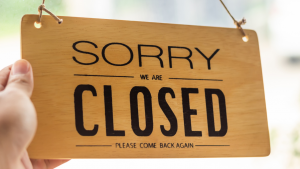
Charlie Riedel’s amazing photograph of Simone Biles at the Paris Olympics
Gymnasts get the twisties. Golfers get the yips. Can writers get the typies?
In 2021, gymnast Simone Biles pulled out of the Tokyo Olympics saying that she was “having a little bit of the twisties”. Last week, she was back at the Olympics in Paris, once again performing incredible feats of gymnastics and demonstrating the grace and strength that has made her famous.
But what are the twisties, and what do they have to do with golf and writer’s block?
Success in gymnastics, like all sports, requires amazing mental acuity — you need to be able to know, at all times, where your body is in space and how to control its movement so that you land safely. We all have the ability, called proprioception or kinaesthesia, to know where our body is in relation to the world around us. If we didn’t, we wouldn’t be able to walk or type or knit or, in fact, do anything.
But some gymnasts suddenly and unexpectedly lose this sense midair, making it a challenge to land safely. In 2021, when Biles was struck by the twisties, she had to cut a 2.5 rotation down to a 1.5 rotation because she wasn’t sure if she could “make it all the way around”. She described the feeling as being “lost in the air”.
Biles did, ultimately, avoid injury, but other gymnasts have not been so lucky. When former gymnast Christina Myers tried to push through the twisties, she wound up with a spinal stress fracture.
“Imagine skydiving and your parachute won’t open,” she said. “Your body starts adding extra twists and flips to the skill you’re supposed to be doing, and it can affect even the skills that feel as routine as walking to an elite gymnast…
“Your brain wants nothing more than to perform the intended skill correctly, but your body feels like it suddenly has a mind of its own.”
Similar to the twisties, the yips are found in sports like golf, cricket, tennis, and baseball, where the golfer or other sportsperson finds themselves unable to carry out actions that they used to be able to perform without problem. The yips cause a loss of fine motor skills and muscle memory, and affects athletes’ decision-making. Whilst some people do recover after a period of yips, it can also be career-ending.
Tommy Armour, a Scottish golfer who coined the term ‘the yips’, described it as “a brain spasm that impairs the short game.” Johnny Miller had the yips so bad that he couldn’t even look at the ball or the end of his golf club whilst putting, so “placed a dab of red fingernail polish on the grip, below the position of his right thumb, and looked at that instead”, or even putted with his eyes shut.
In June, I wrote about how writer’s block is not a myth, and how researchers have identified four categories of cause:
- Physiological causes: Stress, anxiety, extreme emotional states such as grief, mental or physical health issues, and exhaustion.
- Motivational causes: Fear of criticism, performance anxiety, and lack of enjoyment.
- Cognitive causes: Perfectionism, problems associated with over-planning or under-planning, and rigid thinking, such as forcing a story to move in a certain direction.
- Behavioural causes: Procrastination, interruptions to writing, and being too busy to write.
But there is, in my experience, a form of writer’s block that is a lot more like the yips or the twisties, which isn’t connected to motivational, cognitive or behavioural causes and doesn’t seem to have a clear physiological cause.
Sometimes, for no apparent reason at all, I do get writer’s yips or twisties — what we could potentially call the typies — wherein I just stop being able to write. Despite knowing that I know how. Despite having ideas. Despite having time. Despite having faced my fears and set them aside. Despite even having a clear plan for what to do next.
Somehow, there’s a mental disconnect that gets in my way. I feel like I just don’t know how to write. It’s not that I literally forget how to type – I can do all sorts of other bits of writing, but I just can’t progress whatever my current big project is.
Although some have speculated that the yips are a form of performance anxiety, the fact that they affect some specific actions and not others indicates a more complex cause. The yips can cause involuntary muscle spasms, which seem to have a neurological aspect. In these cases, the golfers have developed what’s called ‘focal dystonia’:
Dystonia is a movement disorder that causes the muscles to contract. This can cause twisting motions or other movements that happen repeatedly and that aren’t under the person’s control.
Mogigraphia, or writer’s cramp, is possibly the first focal dystonia to have been identified and described, notably by English physician William Gowers in the late 19th century. Gowers also linked it to similar problems suffered by “telegraph operators, seamstresses, knitters, masons, sailors, painters, enamellers, cigarette makers, and musicians”.
Although the typies isn’t writer’s cramp, just as the twisties probably isn’t a form of dystonia (as far as I can tell), it is perhaps from the yips that we can draw inspiration for how to deal with the typies. The New Yorker talks about golf coach Hank Haney, who controlled his yips in a similar way to Miller, by looking at the audience instead of the ball.
[Haney] had noticed that, on the few occasions when he couldn’t avoid demonstrating a shot with his driver, he was able to do so successfully if he looked at his audience, not the ball, while he swung—a feat that impressed his students but for him was an act of desperation. “That was something I discovered by trial and error,” he told me. “Focussing my eyes and my attention on something different—anything to not anticipate the hit, anything to not anticipate the moment of contact with the ball.” In his new swing, he glanced at the ball only briefly, at the very beginning of his routine; during the actual swing, he kept his eyes on the brim of his cap.
When I’ve had* the typies, I’ve generally just waited for it to go away, which can take weeks if not months. It would undoubtedly be better for me to be able to recognise when it’s happening and learn to deal with it by focusing on something different. Instead of looking out for what’s wrong in my writing, I should do a read through and only highlight what’s right. Instead of trying to work out why something isn’t working, look at what is. Instead of waiting, wrap myself in reminders that I am actually a capable writer.
Thankfully, unlike the twisties, the typies is unlikely to result in physical injury. But it is frustrating to lose so much time to this unsatisfyingly vague and difficult to pin down form of writer’s block. At least now I feel like I have tactics to try when it happens again.
*I say “had”, but I’m coming out of a six-week bout of the typies right now, and it has not been much fun.
{ Comments on this entry are closed }













